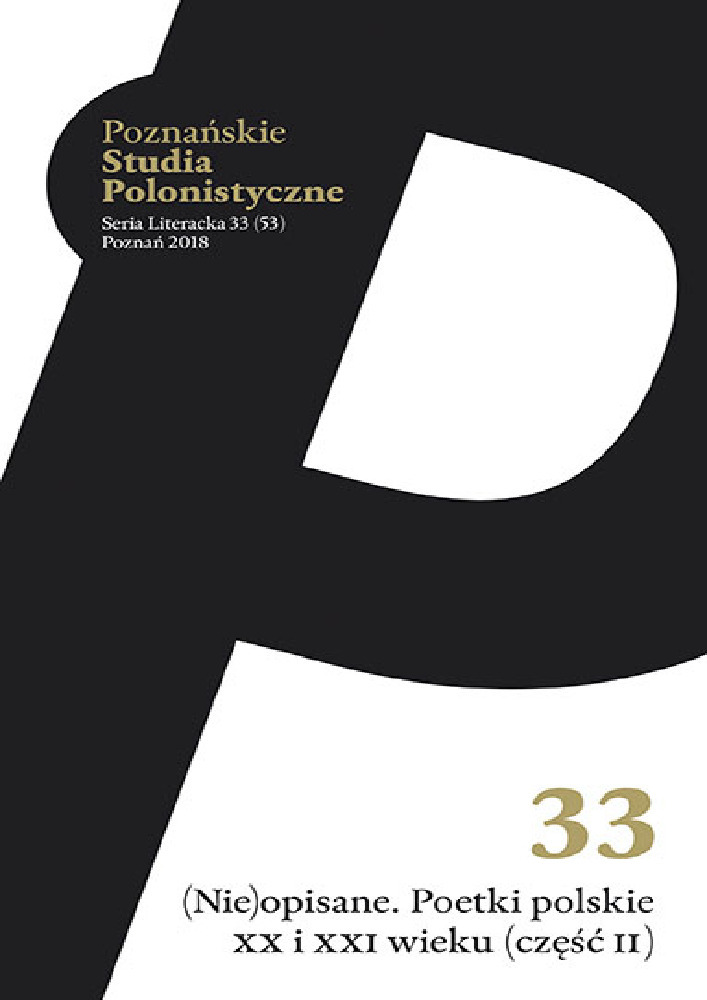Abstract
The paper looks at two book-length poems by Alice Oswald’s: Dart (2002) and Memorial (2011) as translation projects, with an aim to understand both the nature of Oswald’s poetic practice and her concept of what is the meaning and goal of translation in creative work. I claim that translation, in the special sense the poet gives to this term, is at the very core of her work. In my analysis I concentrate on the physical aspect of Oswald’s poetic practice, the role of the body, movement in space, muscular effort, rhythm and memorization of poetry in her projects. I also look at the ways of crossing the divide between the human and non-human, linking language to the voice of the natural world and returning to oral poetry in her work.References
Berman Antoine (2009), Przekład jako doświadczenie obcego, przeł. Uta Hrehorowicz, w: Współczesne teorie przekładu. Antologia, red. Piotr Bukowski, Magda Heydel, Znak, Kraków, s. 247-264.
Brown Clare, Paterson Don, red. (2003), Don’t Ask Me What I Mean: Modern Poets in their Own Words, Picador, London, s. 207-209.
Crown Sarah (2011), Alice Oswald: Haunted by Homer, https://www.theguardian.com/books/2011/oct/09/alice-oswald-homer-iliadinterview [dostęp: 10 lutego 2017].
Farrier David (2014), ‘Like a Stone’: Ecology, Energeia, and Ethical Time in Alice Oswald’s „Memorial”, „Environmental Humanities”, t. 4, s. 1-18.
Hahnemann Carolin (2014), Book of Paper, Book of Stone: An Exploration of Alice Oswald’s Memorial, „Arion: A Journal of Humanities and the Classics”, t. 22, nr 1, s. 1-32.
Heydel Magda (2015), Powrót do świata: unikam poezji natury, http://www.dwutygodnik.com/artykul/5963-powrot-do-swiata-unikampoezji-natury.html [dostęp: 20 sierpnia 2017].
Jakobson Roman (2009), O językoznawczych aspektach przekładu, przeł. Lucylla Pszczołowska, w: Współczesne teorie przekładu. Antologia, red. Piotr Bukowski, Magda Heydel, Znak, Kraków, s. 41-50.
Malinowski Bronisław (2013), Tłumaczenie słów nieprzetłumaczalnych, przeł. Barbara Strassberg, w: Polska myśl przekładoznawcza. Antologia, red. Piotr Bukowski, Magda Heydel, WUJ, Kraków, s. 39-52.
Oswald Alice (2000), The Universe in Time of Rain Makes the World Alive with Noise, w: A Green Thought in a Green Shade: Poetry in the Garden, red. Sarah Maguire, Poetry Society, London, s. 35-48.
Oswald Alice (2002), Dart, Faber, London.
Oswald Alice (2011), Memorial. An Excavation from the „Iliad”, Faber, London.
Oswald Alice (2015), Wiersze, przeł. Magda Heydel, w: Jerzy Jarniewicz, Magda Heydel, Poetki z Wysp, Biuro Literackie-Instytut Kultury Miejskiej, Wrocław–Gdańsk, s. 167-202.
Pinard Mary (2009), Voice(s) of the Poet-Gardener: Alice Oswald and the Poetry of Acoustic Encounter, „Interdisciplinary Literary Studies”, t. 10, nr 2, Ecopoetics and the Eco-Narrative, s. 17-32.
Ricoeur Paul (2009), Paradygmat przekładu, przeł. Małgorzata Kowalska, w: Współczesne teorie przekładu. Antologia, red. Piotr Bukowski, Magda Heydel, Znak, Kraków, s. 357-371.
Steiner George (2009), Ruch hermeneutyczny, przeł. Olga i Wojciech Kubińscy, w: Współczesne teorie przekładu. Antologia, red. Piotr Bukowski, Magda Heydel, Znak, Kraków, s. 327-334.
License
Authors
Authors of texts accepted for publication in „Poznańskie Studia Polonistyczne. Seria Literacka” are required to complete, sign and return to the editor's office the Agreement for granting a royalty-free license to works with a commitment to grant a CC sub-license.
Under the agreement, the authors of texts published in „Poznańskie Studia Polonistyczne. Seria Literacka” grant the Adam Mickiewicz University in Poznań a non-exclusive, royalty-free license and authorize the use of Attribution-NoDerivatives 4.0 International (CC BY-ND 4.0)Creative Commons sub-license.
The authors retain the right to continue the free disposal of the work.
Users
Interested Internet users are entitled to use works published in „Poznańskie Studia Polonistyczne. Seria Literacka” since 2016, for non-commercial purposes only, under the following conditions:
- attribution - obligation to provide, together with the distributed work, information about the authorship, title, source (link to the original work, DOI) and the license itself.
- no derivatives - the work must be preserved in its original form, without the author's consent it is not possible to distribute the modified work, such as translations, publications, etc.
Copyrights are reserved for all texts published before 2016.
Miscellaneous
Adam Mickiewicz University in Poznań retains the right to magazines as a whole (layout, graphic form, title, cover design, logo etc.).
